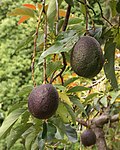Avocado
Avocado (Persea americana) is the dull yellowish green of the meat of an avocado; noun a pear-shaped tropical fruit with green or blackish skin and rich yellowish pulp enclosing a single large seed; It is a tropical American tree bearing large pulpy green fruits.
Classification[edit]
- Genus:Persea
- Species:Americana
Habitat[edit]
The avocado is a medium-sized, evergreen tree in the laurel family (Lauraceae), native to the Americas.



An avocado is a fruit that is native to Mexico and Central America. It is known for its creamy texture and rich, nutty flavor, and is a popular ingredient in many dishes around the world.
Description[edit]
Avocados are pear-shaped fruits that have a hard, dark green outer skin and a soft, creamy interior. They are high in healthy fats and are a good source of vitamins and minerals, including vitamin C, vitamin K, and potassium. There are several different varieties of avocado, including Hass, Fuerte, and Reed. The Hass avocado is the most widely grown variety and is known for its creamy texture and nutty flavor.
Culinary Uses[edit]
Avocados are a versatile ingredient that can be used in a variety of dishes. They are often used in guacamole, a popular Mexican dip that also includes tomatoes, onions, and lime juice. Avocado is also commonly used in salads, sandwiches, and smoothies. In recent years, avocados have become a popular ingredient in vegetarian and vegan diets, as they are a good source of healthy fats and protein.
Health Benefits[edit]
Avocados are high in healthy fats, fiber, and antioxidants, and have been found to have several health benefits. They may help to reduce cholesterol levels and lower the risk of heart disease, as well as improve digestion and promote healthy skin. However, it is important to consume avocados in moderation, as they are also high in calories and fat.
-
Avocado on a tree
-
Avocado toast in stockholm
-
Spicy salmon avocado tostadas
-
Crab and avocado salad
-
Avocado Eggrolls from Cheesecake Factory
-
Avocado Salad
Facts about Avocado[edit]
Here are some interesting facts about avocados:
- An avocado is also called an alligator pear because some avocados have a rough, pebbly green skin like an alligator.
- Avocado can be either pear-shaped or egg-shaped with a skin color ranging from dark green to black.
- Most California avocados have a pebbled, rough skin while Florida and Mexican avocados usually have smooth skin.
- The flesh of avocados is pale yellow to gold in color with a delicate, sweet, nutty flavor.
- Avocados have a large pit and grow in tropical, warm climates on trees approximately 66 feet tall.
- Avocados originated in Puebla, Mexico in 10,000 BC and the most common variety is known as Hass.
- 95% of the United States avocados come from Southern California with Florida being the next top producing state.
- Mexico produces the most avocados in the world.
- Avocados are a climacteric fruit which means it matures on the tree, but ripens off the tree; similar to a banana or a pear.
- Avocados have a higher fat content than most fruits but it is mostly the good fat, monounsaturated.
- Avocados have 35% more potassium than a banana which is important for normal blood pressure, muscle growth and the functioning of the brain and nervous system.
- Avocado is popular among vegetarians and is substituted for meat in sandwiches and salads because of its high fat content.
- Most avocados are eaten raw and are the main ingredient in a Mexican dip called “guacamole”.
- In the Philippines, Brazil, Indonesia, Vietnam, and Southern India, avocados are frequently used for milkshakes.
- In Haiti, avocados are eaten at breakfast with bread or cassava.
- In Iran, avocados are used as a rejuvenating facial cream.
- Avocados are often added to sandwiches and salads as a garnish and used in a popular sushi known as a “California Roll”.
- You can ripen an avocado by putting it in a brown paper bag and if you add an apple it will ripen even quicker.
- The flesh of an avocado turns brown when exposed to air and it is recommended to add lemon or lime juice after peeling to prevent them from turning brown.
- You can grow avocados indoors by inserting 3 or 4 toothpicks into the pit about one third of the way up the pit and placing it in a jar with warm water. The toothpicks should sit on the jar rim allowing the bottom part of the pit to sit in the water. It should split in 4 to 6 weeks and yield roots and sprout.
| Portion | 100 g |
|---|---|
| Fiber, total dietary | 6.7 g |
| Calcium, Ca | 12 mg |
| Iron, Fe | 0.55 mg |
| Vitamin A, IU | 146 IU |
| Vitamin C, total ascorbic acid | 10 mg |
| Protein | 2 g |
| Total lipid (fat) | 14.66 g |
| Carbohydrate, by difference | 8.53 g |
| Energy | 670 kcal |
| Sugars, total including NLEA | 0.66 g |
| Cholesterol | 0 mg |
| Sodium, Na | 7 mg |
| Fatty acids, total saturated | 2.126 g |
References[edit]
See also[edit]
| Types of fruits | ||||||||
|---|---|---|---|---|---|---|---|---|
|
| Avocados | ||||||
|---|---|---|---|---|---|---|
|
Ad. Transform your life with W8MD's Budget GLP-1 injections from $49.99


W8MD offers a medical weight loss program to lose weight in Philadelphia. Our physician-supervised medical weight loss provides:
- Weight loss injections in NYC (generic and brand names):
- Zepbound / Mounjaro, Wegovy / Ozempic, Saxenda
- Most insurances accepted or discounted self-pay rates. We will obtain insurance prior authorizations if needed.
- Generic GLP1 weight loss injections from $49.99 for the starting dose of Semaglutide and $65.00 for Tirzepatide.
- Also offer prescription weight loss medications including Phentermine, Qsymia, Diethylpropion, Contrave etc.
NYC weight loss doctor appointmentsNYC weight loss doctor appointments
Start your NYC weight loss journey today at our NYC medical weight loss and Philadelphia medical weight loss clinics.
- Call 718-946-5500 to lose weight in NYC or for medical weight loss in Philadelphia 215-676-2334.
- Tags:NYC medical weight loss, Philadelphia lose weight Zepbound NYC, Budget GLP1 weight loss injections, Wegovy Philadelphia, Wegovy NYC, Philadelphia medical weight loss, Brookly weight loss and Wegovy NYC
|
WikiMD's Wellness Encyclopedia |
| Let Food Be Thy Medicine Medicine Thy Food - Hippocrates |
Medical Disclaimer: WikiMD is not a substitute for professional medical advice. The information on WikiMD is provided as an information resource only, may be incorrect, outdated or misleading, and is not to be used or relied on for any diagnostic or treatment purposes. Please consult your health care provider before making any healthcare decisions or for guidance about a specific medical condition. WikiMD expressly disclaims responsibility, and shall have no liability, for any damages, loss, injury, or liability whatsoever suffered as a result of your reliance on the information contained in this site. By visiting this site you agree to the foregoing terms and conditions, which may from time to time be changed or supplemented by WikiMD. If you do not agree to the foregoing terms and conditions, you should not enter or use this site. See full disclaimer.
Credits:Most images are courtesy of Wikimedia commons, and templates, categories Wikipedia, licensed under CC BY SA or similar.
Translate this page: - East Asian
中文,
日本,
한국어,
South Asian
हिन्दी,
தமிழ்,
తెలుగు,
Urdu,
ಕನ್ನಡ,
Southeast Asian
Indonesian,
Vietnamese,
Thai,
မြန်မာဘာသာ,
বাংলা
European
español,
Deutsch,
français,
Greek,
português do Brasil,
polski,
română,
русский,
Nederlands,
norsk,
svenska,
suomi,
Italian
Middle Eastern & African
عربى,
Turkish,
Persian,
Hebrew,
Afrikaans,
isiZulu,
Kiswahili,
Other
Bulgarian,
Hungarian,
Czech,
Swedish,
മലയാളം,
मराठी,
ਪੰਜਾਬੀ,
ગુજરાતી,
Portuguese,
Ukrainian
- Avocado
- Crops originating from Mexico
- Crops originating from South America
- Crops originating from the Americas
- Extant Miocene first appearances
- Fruit trees
- Persea
- Trees of Belize
- Trees of Costa Rica
- Trees of Guatemala
- Trees of Honduras
- Trees of Mexico
- Trees of Nicaragua
- Tropical agriculture
- Tropical fruit
- Cloud forest flora of Mexico






